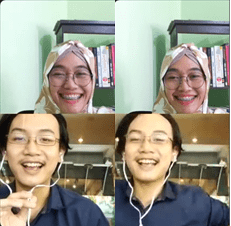
Yogyakarta. June 4th 2020—Career Development Center (CDC) of Universitas Gadjah Mada held another live session of psychoeducation series that discussed about toxic relationship with Dina Wahida, the psychologist of CDC and was moderated by Davin Ezra Pradipta as the Peer Counselor of CDC FISIPOL. The discussion was held on the Instagram account of CDC, @cdcfisipolugm. “Basically, humans can’t live alone, especially in this pandemic situation. No matter how introvert they are, they still need to connect with others to share and tell stories. We need a group and other people in our daily lives,” Dina said in the opening of the discussion series.
“The definition of toxic relationship is, in psychology, a bad relationship that wrapped positively. A relationship could be toxic because it was considered as our cultural norm and our habit. For the example, a mother that demands her child to do what she wants is considered as normal, or when a man forced a woman to cook,” Dina said. Dina explained that a relationship that was built in a toxic way, such as calculate every things and oftenly bring up the past events, could be a problem. “Calculates who is the most disadvantaged, who has the biggest role, or even brings up the past events to divert from the existing problems that are currently happening. It could create a toxic relationship,” Dina said.
Dina explained that in a relationship, conflict is needed, so we can do a good conflict management. But, if the toxic relationship continues, conflict would eliminate a good relationship. “Before it happened, we were sure about the relationship but become doubtful. We were also close but become distant,” Dina said. Other than calculates every things and oftenly bring the past events, the characteristic of toxic relationship also including the passive-aggressive. It seems like they did not want to hurt you but they also being satire. “This kind of way in a relationship could make the relationship unreceptive and increase the judgment,” Dina said.
“Blaming each other, it happened very often in a relationship and very classic. The effects of the blames are same as bullying, it is depressing. There is a jealousy in the name of love, such as overprotective. There is also ‘bribing’, such as giving a gift after arguing. It is better to give a gift sincerely, not because of you feel sorry,” Dina said.
According to Dina, it was important for us to have a positive relationship that could be started in some ways. First, appreciation and affection to appreciate who cares about us. Second, build and keep a positive communication even though we already known each other. Third, take time to relax together. “Having fun together is important, so you can have quality time, so that it would not incriminating either one of you,” Dina said.
According to Dina, one important thing to do was making certain values together. “Because values are the unwritten agreement, many people do not have references. The most challenging thing in making values is how to manage the stress together and make the conflict as an opportunity to organize your relationship,” Dina said.
“In case of managing the relationships in this pandemic, we should change our way of thinking that pandemic is not the only obstacle. Because of the mindset that we can not go anywhere and everything are limited. We should try to change our mindset to take an opportunity and taking on the meaning of what we could get from this situation,” Dina said as the closing of this live session event on that Thursday afternoon.
